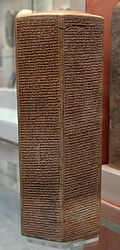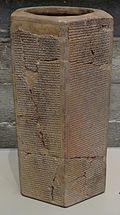| Isaiah 37 | |
|---|---|
 The Great Isaiah Scroll, the best preserved of the biblical scrolls found at Qumran from the second century BC, contains all the verses in this chapter. | |
| Book | Book of Isaiah |
| Hebrew Bible part | Nevi'im |
| Order in the Hebrew part | 5 |
| Category | Latter Prophets |
| Christian Bible part | Old Testament |
| Order in the Christian part | 23 |
Isaiah 37 is the thirty-seventh chapter of the Book of Isaiah in the Hebrew Bible or the Old Testament of the Christian Bible. This book contains the prophecies attributed to the prophet Isaiah, and is one of the Books of the Prophets.





